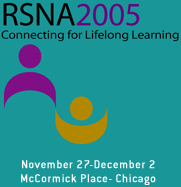
Abstract Archives of the RSNA, 2005
Florian Koppelstaetter MD, Presenter: Nothing to Disclose
Christian Michael Siedentopf, Abstract Co-Author: Nothing to Disclose
Thorsten Poeppel, Abstract Co-Author: Nothing to Disclose
Ilka Haala, Abstract Co-Author: Nothing to Disclose
Anja Ischebeck, Abstract Co-Author: Nothing to Disclose
Felix Mottaghy MD,PhD, Abstract Co-Author: Nothing to Disclose
Paul Rhomberg, Abstract Co-Author: Nothing to Disclose
Michael Verius PhD, Abstract Co-Author: Nothing to Disclose
Stefan Golaszewski, Abstract Co-Author: Nothing to Disclose
Christian Kolbitsch MD, Abstract Co-Author: Nothing to Disclose
Bernd Krause, Abstract Co-Author: Nothing to Disclose
Stefan Felber, Abstract Co-Author: Nothing to Disclose
et al, Abstract Co-Author: Nothing to Disclose
Previous fMRI studies have shown the potential of caffeine to modulate the BOLD-signal by boosting the BOLD response. However the cerebral mechanisms underlying this effect are largely unknown, neurovascular and neuronal effects seem to be involved.
In our fMRI study we tested the hypothesis that oral caffeine excess during a verbal working memory task modulates working memory processes on a behavioural as well as on the functional neuroanatomic level.
11 healthy subjects participated in this study. Each participant had to undergo 2 measurements on a 1,5 T MR-Scanner seperated by a 24 to 48h intervall. After a minimum of 12h fasting and no caffeine and 4h no nicotine exposure subjects received either placebo or 100mg caffeine p.o. 20 min prior to the performance of a 2-back verbal working memory task on each measurement day. Heart frequeny, blood pressure, middle artery pressure and oxygen saturation were monitored before application of caffeine (or placebo) and before and after each fMRI-measurement.
A conventional block-design with 6 alternating pseudo-randomized blocks (210 scans) was used. Post-processing was done with SPM2.
The analysis of the behavioural data improvement of mental performance and reduction of reaction time in the caffeine condition. The monitored data brought no significant differences between caffeine and placebo. FMRI data show typical activation pattern of working memory in both conditions. The cognitive subtraction analysis of “caffeine” minus “placebo” revealed significant activation differences in the frontal, in the AC and the inferior parital cortex and in the precuneus accentuated on the left hemishere. “Placebo” minus “caffeine” showed no result.
Our fMRI study for the first time demonstrates the influence of oral caffeine excess on working memory processes on behavioural and functional neuroanatomic level. Increased activations being indicative of a positive BOLD modulation and increased BOLD responses due to caffeine were observed in brain regions subserving central executive functions as well as in posterior cortical regions for processing of verbal information.
Koppelstaetter, F,
Siedentopf, C,
Poeppel, T,
Haala, I,
Ischebeck, A,
Mottaghy, F,
Rhomberg, P,
Verius, M,
Golaszewski, S,
Kolbitsch, C,
Krause, B,
Felber, S,
et al, ,
Influence of Caffeine Excess on Activation Patterns in Verbal Working Memory. Radiological Society of North America 2005 Scientific Assembly and Annual Meeting, November 27 - December 2, 2005 ,Chicago IL.
http://archive.rsna.org/2005/4418422.html

